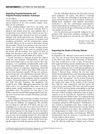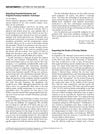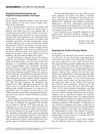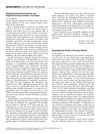 January 2021 in “Springer eBooks”
January 2021 in “Springer eBooks” Different rheumatological diseases can cause specific skin problems.
 June 2021 in “Journal of dermatology and dermatitis”
June 2021 in “Journal of dermatology and dermatitis” Most dermatologists in Western Rajasthan prefer the anti-depressant Doxepin for elderly skin conditions and often refer patients to a psychiatrist.
 January 2021 in “Clinical dermatology open access journal”
January 2021 in “Clinical dermatology open access journal” Dermatologists in Western Rajasthan often prescribe doxepin for elderly patients with skin and mental health issues.
 1 citations,
January 1967 in “The BMJ”
1 citations,
January 1967 in “The BMJ” The document concludes that while some hair and scalp disorders can be treated, hair loss from destroyed follicles is permanent, and damaged hair can only regrow naturally.
 25 citations,
January 2015 in “Advances in Psychosomatic Medicine”
25 citations,
January 2015 in “Advances in Psychosomatic Medicine” Many skin patients also have mental health issues, and doctors should treat both together.
 27 citations,
September 2018 in “Skin appendage disorders”
27 citations,
September 2018 in “Skin appendage disorders” Hair transplantation may work for some types of scarring alopecia, but results vary and more research is needed.
 8 citations,
August 1997 in “Australasian Journal of Dermatology”
8 citations,
August 1997 in “Australasian Journal of Dermatology” Most HIV patients develop skin symptoms that can indicate the stage of their disease.
 1 citations,
July 2012 in “Nasza Dermatologia Online”
1 citations,
July 2012 in “Nasza Dermatologia Online” CCCA may be caused by both hair traction and an immune response.

Skin changes throughout life, from development before birth to aging effects like wrinkles, influenced by both genetics and environment.
 27 citations,
January 1990 in “Child Psychiatry & Human Development”
27 citations,
January 1990 in “Child Psychiatry & Human Development” The document concludes that supportive home environments and addressing parent-child interactions can effectively treat trichotillomania in children.
 8 citations,
January 2020 in “Plastic and Aesthetic Nursing”
8 citations,
January 2020 in “Plastic and Aesthetic Nursing” The article concludes that different types of hair loss require specific treatments and psychological support is important.
 7 citations,
February 2012 in “Facial Plastic Surgery”
7 citations,
February 2012 in “Facial Plastic Surgery” The mini-lift is a less invasive face-lift for younger patients that is quicker, cheaper, and has a fast recovery, but is less effective for the midface and excessive neck skin.
 3 citations,
November 1999 in “Journal of Cutaneous Medicine and Surgery”
3 citations,
November 1999 in “Journal of Cutaneous Medicine and Surgery” Examining scalp biopsies in different ways helps better diagnose hair loss types.
 2 citations,
October 2020 in “Dermatologie pro praxi”
2 citations,
October 2020 in “Dermatologie pro praxi” Early diagnosis is crucial for treating alopecia effectively.
 2 citations,
September 2012 in “Actas Dermo-Sifiliográficas”
2 citations,
September 2012 in “Actas Dermo-Sifiliográficas” Societal pressure for the perfect body leads to health risks and disorders.
 2 citations,
December 1999 in “Dermatologic Surgery”
2 citations,
December 1999 in “Dermatologic Surgery” Achieving original hair density with transplants is unrealistic; skilled practitioners are essential for the best results.
 1 citations,
September 2017 in “Textual Practice”
1 citations,
September 2017 in “Textual Practice” The document concludes that Hilary Mantel's memoir shows how childhood experiences affect adult health, criticizing modern medicine for ignoring the mental aspects of physical illness.
 1 citations,
November 2014
1 citations,
November 2014 The document explains hair and nail biology, common hair loss conditions and treatments, oral and genital skin diseases, and the risks and treatments associated with squamous cell carcinoma.
 1 citations,
December 1999 in “Dermatologic Surgery”
1 citations,
December 1999 in “Dermatologic Surgery” Propofol-ketamine and propofol-fentanyl are effective and safe for cosmetic surgery sedation.
 March 2012 in “Pathy's Principles and Practice of Geriatric Medicine”
March 2012 in “Pathy's Principles and Practice of Geriatric Medicine” Older adults often have skin problems due to aging, and treating these conditions requires attention to both physical and mental health.
 January 2010 in “Elsevier eBooks”
January 2010 in “Elsevier eBooks” The document concludes that different types of hair loss have specific treatments, and early diagnosis is crucial for preventing permanent hair loss.
 December 1999 in “Dermatologic Surgery”
December 1999 in “Dermatologic Surgery” Experts discussed sedation, hair transplant techniques, and called for respectful professional communication.
 December 1999 in “Dermatologic Surgery”
December 1999 in “Dermatologic Surgery” Indonesia's dermatologic surgery training program aims to improve patient care by educating skilled surgeons.
 278 citations,
March 2013 in “Gut”
278 citations,
March 2013 in “Gut” Anti-IL-12/IL-23 antibody therapy effectively treats psoriasiform skin lesions in IBD patients.
 221 citations,
January 2014 in “Human Reproduction”
221 citations,
January 2014 in “Human Reproduction” Adding anti-Müllerian hormone to PCOS criteria lowers the number of women diagnosed.
 104 citations,
January 2016 in “Food & Function”
104 citations,
January 2016 in “Food & Function” Olive oil compounds may help prevent cancer in animals, but human results are mixed.
90 citations,
July 2009 in “PTR. Phytotherapy research/Phytotherapy research” Spearmint tea may reduce testosterone and self-reported hair growth in women with PCOS.
 72 citations,
February 2011 in “The American Journal of Dermatopathology”
72 citations,
February 2011 in “The American Journal of Dermatopathology” Anti-TNF therapy can cause a unique type of hair loss that may get better with topical treatments without stopping the therapy.
 72 citations,
January 2003 in “American Journal of Pathology”
72 citations,
January 2003 in “American Journal of Pathology” A protein called CBP is found in prostate cancer and can increase the effectiveness of certain prostate cancer treatments.
72 citations,
June 1979 in “Biochemical Society Transactions” Flutamide and its metabolite can effectively reduce androgen effects.




























